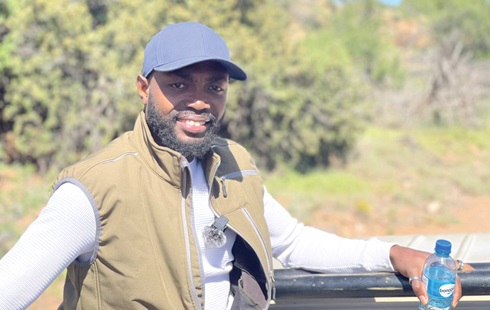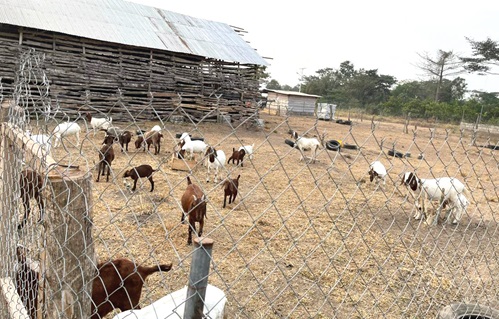
Goat farmer risks losing GH¢5m investment ...Following quit order from Berekum Traditional Council
The hope of a 34-year-old entrepreneur, Frederick Benneh Frimpong, to expand his goat-rearing business at Senase, a suburb of Berekum in the Bono Region, to become a leader in that enterprise in Africa is in limbo.
Advertisement
This is because the Berekum Traditional Council has given him a two-week ultimatum to either vacate the land where he is currently operating, or risk losing his life.
The farm, named: "Semanhyia Learning and Development Farms," which started five years ago, had aimed at building a leading learning and development centre in goat farming in the country and Africa.
The Daily Graphic gathered that the council gave the quit order claiming that the gods of the land prohibited the rearing of goats in the area.
Though the traditional council declined to speak on the issue when the Daily Graphic contacted it, the Registrar of the Berekum Traditional Area, Alhasan Ahmed Saakah, said the council had planned to hold a meeting about the issue before speaking publicly on it.
The over GH¢5million goat farming investment, which is currently facing an immediate evacuation from the borders of the Berekum Traditional Area, owing to tradition, serves as a learning farm for educational and other institutions.
Mr Frimpong who hails from senase, told the Daily Graphic that within five years, he had invested more than GH¢5 million in the business.
Apart from importing some foreign goats such as Kalahari, boar and sahelian at the cost of about $1,500 and some local breeds, the farmer said he had also invested some of the funds in the development of a centre to not only to expand his activities but also train others.
He said the farm currently had about 300 breeds of goats and explained that he was now on the verge of losing all his investments.
"Now there are two things involved in this matter: I either evacuate the goats or sell all of them to shut down the centre," describing the traditional council's two-week ultimatum, which expires by the end of this week, as unexpected, sad and shocking.

Portion of the goat ranch which has generated controversy
He said he had visited the Berekum chief's palace on several occasions to plead, but the council had refused to listen to him.
When asked whether there was an official document to prove the council's quit order, Mr Frimpong said he was only summoned to the chief's palace and was told to vacate the land in two weeks.
The decision by the traditional council, according to Mr Frimpong, had also affected his seven employees and butchers in the area since they had to travel to Techiman, Sunyani, Dormaa Ahenkro, among other areas, to purchase goats to serve their customers.
MoFA
Mr Frimpong said though the Ministry of Food and Agriculture (MoFA) had stepped in to help resolve the issue, he was searching for a new place at Suhum in the Eastern Region to relocate or start a new life.
While he believed in tradition and customs, he was of the belief that those that hurt the progress and development of citizens must be abandoned.
"I am not against the chiefs, but we need to find ways to honour our tradition and at the same time develop our country.
"The decision is hurting my business and plans, because of the amount of investment I have made into the business.
Of course, the land belongs to the chiefs, even though I bought it from them", he said.
Plan
Mr Frimpong said he was preparing to venture into commercial farming explaining that last year, he started constructing facilities to start commercial farming when he was hit by the news from the traditional council.
A returnee from the United States, after earning a degree in social entrepreneurship in the United Kingdom, he started the project five years ago on a six-acre land which he purchased from the late Queen mother of Senase.
He said initially he did not purchase the land to venture into goat rearing, but the decision to do so came later.
He said the idea was to establish a learning and development farm where agricultural institutions could use as a learning centre and also produce enough goats to feed the country.
Apart from investing in the physical structures, he had also sponsored some of his employees to South Africa to acquire knowledge of goat farming.
He said the reason for his plan to venture into that aspect of agriculture was because the livestock industry had been neglected over the years as compared to other sectors such as food crops.
Background
The issue of the ban on rearing of goats on the soil of Berekum area started last year when the traditional council ordered the evacuation of all goats from the Berekum Traditional Area.
Those who resisted the evacuation had their goats either killed or caught by the task force set up by the traditional council.
The matter was put on hold due to the burial rites of the late Berekumhene, Daasebre Dr Amankona Diawuo II.
However, just after the funeral, the chiefs have rekindled the issue and insist that all those who still have goats in the area should either evacuate them or face the wrath of the council.
Owners have had to either sell their goats cheaply or evacuate them to other traditional areas.
Writer's email: [email protected]





